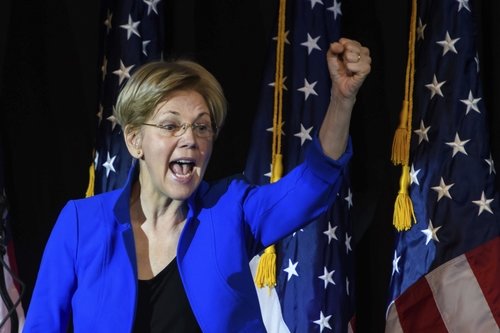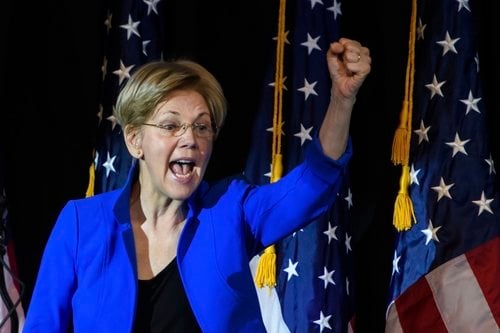
Elizabeth Warren penned her detailed opinion today, telling us it is time to break up Amazon, Google and Facebook, implying they are defacto monopolies. She is correct, they are. Whether they meet the classical definition today or not is secondary, they all have enough market power to effectively block competition and continue to wipe out current foes.
We agree in principle but not with many of the specifics. Here is the objective analysis of the salient points of her writings:
In the 1990s, Microsoft — the tech giant of its time — was trying to parlay its dominance in computer operating systems into dominance in the new area of web browsing. The federal government sued Microsoft for violating anti-monopoly laws and eventually reached a settlement. The government’s antitrust case against Microsoft helped clear a path for Internet companies like Google and Facebook to emerge.
Not only was there no relation between Microsoft’s settlement and the launch of Facebook and Google but Microsoft invested in Facebook to help spur their growth. In addition, they spent and lost billions on Bing to compete with Google but could not ever gain significant share.
Today’s big tech companies have too much power — too much power over our economy, our society, and our democracy. They’ve bulldozed competition, used our private information for profit, and tilted the playing field against everyone else. And in the process, they have hurt small businesses and stifled innovation.
Power over the economy, society and democracy is subjective. Does Hollywood have too much power over society? How can a company have too much power over our economy? By being too successful? Do newspapers and news stations have too much power over our democracy?
Is using private information for profit now illegal? Is providing free service illegal? Not yet.
Have these companies stifled innovation? Absolutely.
I want a government that makes sure everybody — even the biggest and most powerful companies in America — plays by the rules. And I want to make sure that the next generation of great American tech companies can flourish. To do that, we need to stop this generation of big tech companies from throwing around their political power to shape the rules in their favor and throwing around their economic power to snuff out or buy up every potential competitor.
With all due respect to Senator Warren, she and her colleagues write the rules. Where was she when presidential candidate Senator Obama and Eric Schmidt were tied at the hip? In 2009 we pointed out the relationship from Google’s standpoint was to protect their monopoly power.
“Throwing around political power?” In English, this means paying politicians to get what you want. Last I checked, she and her colleagues were politicians, taking the money.
All companies are able to lobby. Is it somehow worse when tech companies do it?
Finally, a well-known statement in Washington is, if you don’t have a seat at the table, you are on the menu. As long as politicians are enriching themselves via lobbyists and corporate favors, tech or other companies can’t be blamed.
That’s why my Administration will make big, structural changes to the tech sector to promote more competition — including breaking up Amazon, Facebook, and Google.
Tell us more.
America’s big tech companies provide valuable products but also wield enormous power over our digital lives. Nearly half of all e-commerce goes through Amazon. More than 70% of all Internet traffic goes through sites owned or operated by Google or Facebook.
This seems like too much power – we have to agree.
As these companies have grown larger and more powerful, they have used their resources and control over the way we use the Internet to squash small businesses and innovation, and substitute their own financial interests for the broader interests of the American people. To restore the balance of power in our democracy, to promote competition, and to ensure that the next generation of technology innovation is as vibrant as the last, it’s time to break up our biggest tech companies.
America’s big tech companies have achieved their level of dominance in part based on two strategies:
- Using Mergers to Limit Competition. Facebook has purchased potential competitors Instagram and WhatsApp. Amazon has used its immense market power to force smaller competitors like Diapers.com to sell at a discounted rate. Google has snapped up the mapping company Waze and the ad company DoubleClick. Rather than blocking these transactions for their negative long-term effects on competition and innovation, government regulators have waved them through.
- Using Proprietary Marketplaces to Limit Competition. Many big tech companies own a marketplace — where buyers and sellers transact — while also participating on the marketplace. This can create a conflict of interest that undermines competition. Amazon crushes small companies by copying the goods they sell on the Amazon Marketplace and then selling its own branded version. Google allegedly snuffed out a competing small search engine by demoting its content on its search algorithm, and it has favored its own restaurant ratings over those of Yelp.
Facebook’s Instagram purchase was done so early on that it was not a guarantee that their market dominance would be secured by the purchase. WhatsApp was really in an adjacent or even different space. If this purchase should not have been allowed then one wonders what purchases if any, large companies should be allowed to make.
What Amazon did to Diapers was the equivalent of a mafia threat – extremely unethical but not illegal. Amazon’s massive market power does allow it to turn the screws unfairly on competition.
Amazon sells generic brands that compete with their sellers and if this is unfair then does Costco have to stop selling Kirkland products? Are consumers not savvy enough to pass on generic products if they provide insufficient value?
Google has hid behind algorithms to destroy countless competitors over time. Ask any media company behind closed doors and they will agree.
The problem with Warren’s argument though is consumers choose to use Google, not because they are forced but because their product is either better or not so bad that consumers make the effort to switch.
Weak antitrust enforcement has led to a dramatic reduction in competition and innovation in the tech sector. Venture capitalists are now hesitant to fund new startups to compete with these big tech companies because it’s so easy for the big companies to either snap up growing competitors or drive them out of business. The number of tech startups has slumped, there are fewer high-growth young firms typical of the tech industry, and first financing rounds for tech startups have declined 22% since 2012.
If there is an argument to be made about the current state of tech monopolies it is that in the digital world – the ability to leverage entrenched relationships makes it very easy to take competitors’ ideas and wipe them out overnight.
This however is common in tech as IBM and Microsoft took the ideas of standalone software companies and baked them into their operating system upgrades for many decades.
The internet however makes it far easier to wipe away startups by stealing their business models.
Finally, antitrust rules are typically looked at from the standpoint of customer benefit. It is tough to make the case that these acquisitions specifially hurt consumers.
With fewer competitors entering the market, the big tech companies do not have to compete as aggressively in key areas like protecting our privacy. And some of these companies have grown so powerful that they can bully cities and states into showering them with massive taxpayer handouts in exchange for doing business, and can act — in the words of Mark Zuckerberg — “more like a government than a traditional company.”
At no point did Amazon bully any city – this is an inaccurate description of Amazon shopping for a location for their HQ2. Cities and states were able to compete with tax incentives as they do for thousands or tens of thousands of companies each year.
The only thing about Amazon which was different was the scale of the negotiations.
We must ensure that today’s tech giants do not crowd out potential competitors, smother the next generation of great tech companies, and wield so much power that they can undermine our democracy.
A noble goal.
But where the value of the company came from its network, reformers recognized that ownership of a network and participating on the network caused a conflict of interest. Instead of nationalizing these industries — as other countries did — Americans in the Progressive Era decided to ensure that these networks would not abuse their power by charging higher prices, offering worse quality, reducing innovation, and favoring some over others. We required a structural separation between the network and other businesses, and also demanded that the network offer fair and non-discriminatory service.
In this tradition, my administration would restore competition to the tech sector by taking two major steps:
First, by passing legislation that requires large tech platforms to be designated as “Platform Utilities” and broken apart from any participant on that platform.
Companies with an annual global revenue of $25 billion or more and that offer to the public an online marketplace, an exchange, or a platform for connecting third parties would be designated as “platform utilities.”
These companies would be prohibited from owning both the platform utility and any participants on that platform. Platform utilities would be required to meet a standard of fair, reasonable, and nondiscriminatory dealing with users. Platform utilities would not be allowed to transfer or share data with third parties.
This is again – good in concept but let’s think through the reality. Warren is concerned that a company like Amazon would abuse its power by charging higher prices for worse quality.
She also cites the brand Amazon Basics – their generic brand as a problem. Typically though, this line of products gets solid reviews and is cheaper than alternatives.
Wouldn’t elimination of Amazon Basics sold by Amazon be bad for consumers?
Google also uses its search results pages to tout its own products and services.
Quite often these services are useful.
Other times however, Google alters its searches in a way which penalizes content creators who rely on advertising/sponsorships as a revenue source. In this way, they gain a larger share of the advertising market. This is done from a position of monopoly power and hidden in the guise of “algorithm updates.” We wish Senator Warren addressed this practice.
For smaller companies (those with annual global revenue of between $90 million and $25 billion), their platform utilities would be required to meet the same standard of fair, reasonable, and nondiscriminatory dealing with users, but would not be required to structurally separate from any participant on the platform.
To enforce these new requirements, federal regulators, State Attorneys General, or injured private parties would have the right to sue a platform utility to enjoin any conduct that violates these requirements, to disgorge any ill-gotten gains, and to be paid for losses and damages. A company found to violate these requirements would also have to pay a fine of 5 percent of annual revenue.
Amazon Marketplace, Google’s ad exchange, and Google Search would be platform utilities under this law. Therefore, Amazon Marketplace and Basics, and Google’s ad exchange and businesses on the exchange would be split apart. Google Search would have to be spun off as well.
There are just so many challenges here – will companies move overseas to avoid these restrictions? Can we stop that from happening? Does the U.S. intend to break up multinational companies which have a headquarters in Russia and China? Europe? Will investment in the U.S. decrease because of these punitive measures tied to success?
It is worth noting that Google’s move to have a new parent company, Alphabet shows they know eventually they will be split up. Amazon opening new grocery stores which could compete with Whole Foods is likely done for similar reasons.
Second, my administration would appoint regulators committed to reversing illegal and anti-competitive tech mergers.
Current antitrust laws empower federal regulators to break up mergers that reduce competition. I will appoint regulators who are committed to using existing tools to unwind anti-competitive mergers, including:
- Amazon: Whole Foods; Zappos
- Facebook: WhatsApp; Instagram
- Google: Waze; Nest; DoubleClick
Unwinding these mergers will promote healthy competition in the market — which will put pressure on big tech companies to be more responsive to user concerns, including about privacy.
Let’s go through this one by one.
Zappos is in the same business at Amazon – and spinning it off would make some sense. But it is really tough to see this move affecting Amazon sales by much if anything. In fact, Amazon undercuts Zappos pricing today – imagine if they were real competitors.
Whole Foods is bricks and mortar – in a way it pulls Amazon’s valuation down – which should be good for its competitors. If Amazon had to build a Whole Foods competitor on their own – they could and it is tough to see how Whole Foods could weather such a storm.
Facebook divesting Instagram makes sense but WhatsApp is a different business. There are many messaging alternatives. Although having access to WhatsApp users is a positive for Facebook – it doesn’t seem like WhatsApp helps Facebook’s monopoly position. An independent WhatsApp would however likely become a social networking company over time which would be good for competition.
Google giving up Waze makes sense from the perspective that Google owns the advertising space and their own mapping product is quite strong. But Waze is not really in Google’s core space so forcing a split seems wrong.
Nest is in the smarthome space – Google is just starting to play here so it is tough to see how Nest being split would help much. Also, Amazon has the lion’s share of the smart speaker space – Nest helps Google compete in the smart home.
Without a doubt, Google owning DoubleClick helped solidify the company’s monopoly position in advertising. But we need to give the company tremendous credit for integrating and executing very well. The sooner DoubleClick is separated, the better.
Unwinding these mergers will promote healthy competition in the market — which will put pressure on big tech companies to be more responsive to user concerns, including about privacy.
Promote healthy competition is overly optimistic. No company will improve their responsiveness as a result of these changes.
So what would the Internet look like after all these reforms?
Here’s what won’t change: You’ll still be able to go on Google and search like you do today. You’ll still be able to go on Amazon and find 30 different coffee machines that you can get delivered to your house in two days. You’ll still be able to go on Facebook and see how your old friend from school is doing.
With all due respect Senator, how do you know what these changes will do? At best you can say you hope things will stay the same.
A better argument may be the current system is unsustainable and these changes need to be made – if there is unforeseen collateral damage, it will be worth it and we feel new entrants or adjacent companies will step in to pick up the slack.
Here’s what will change: Small businesses would have a fair shot to sell their products on Amazon without the fear of Amazon pushing them out of business. Google couldn’t smother competitors by demoting their products on Google Search. Facebook would face real pressure from Instagram and WhatsApp to improve the user experience and protect our privacy. Tech entrepreneurs would have a fighting chance to compete against the tech giants.
This is once again way overstated. Amazon could still sidestep distributors and go straight to the manufacturer like they do today.
As mentioned in the media example above, as long as Google is selling ads on search it will have the incentive to demote news and other organizations with successful sponsored story models which give advertisers an alternative.
This could be the biggest problem Google presents to the Internet and it is almost never discussed.
Healthy competition can solve a lot of problems. The steps I’m proposing today will allow existing big tech companies to keep offering customer-friendly services, while promoting competition, stimulating innovation in the tech sector, and ensuring that America continues to lead the world in producing cutting-edge tech companies. It’s how we protect the future of the Internet.
Senator Warren, we are in violent agreement with the goals of your proposal but feel there is a great deal missing and a number of overlooked points which are extremely important to work out.
We are happy to discuss the details with you.






